Everything You Need to Know About Parrot Cages
Discover everything you need to know about parrot cages. We start from the basics, then go throught the toys, perches, food & water dishes...
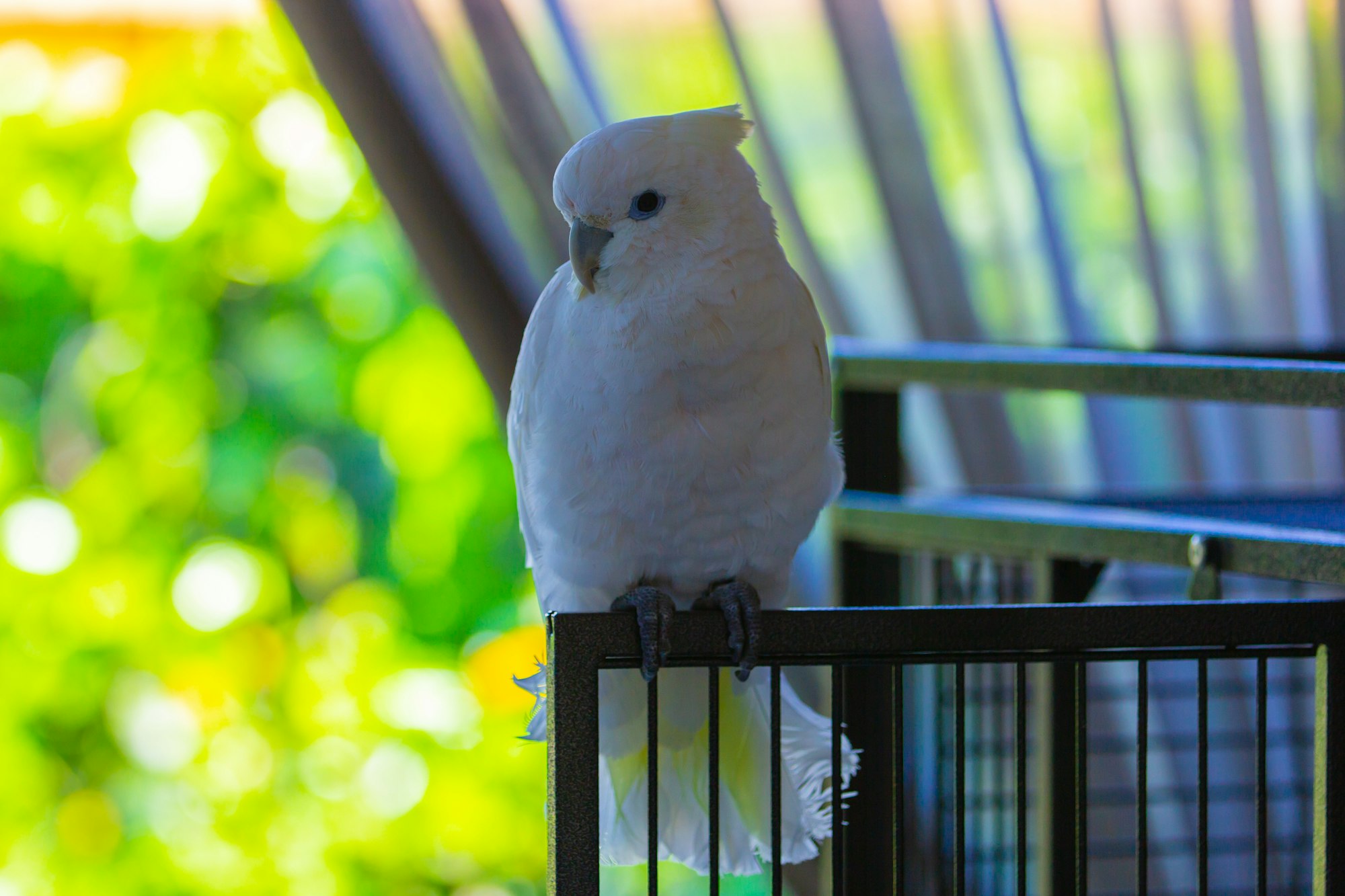
Key Takeaways:
- Choosing the right parrot cage is crucial for the bird's health and happiness.
- Different species of parrots have unique needs that must be considered when selecting a cage.
- Proper maintenance and placement of the cage can significantly impact your parrot's well-being.
Understanding the Importance of a Good Parrot Cage
When it comes to keeping parrots, the cage is more than just a home; it’s a sanctuary. A well-chosen parrot cage can make a world of difference in your bird’s life. Parrots are intelligent and social creatures, and their environment plays a significant role in their overall well-being. The right cage for parrot ensures they have enough space to move, play, and exercise, which is essential for their physical and mental health.
Many people make the mistake of picking a cage based solely on aesthetics. While a beautiful cage might look great in your home, it’s the functionality and suitability for your specific parrot species that truly matter. For instance, macaws need a lot more space compared to smaller parrots like budgies. Therefore, understanding the specific needs of your parrot species is crucial when selecting a cage.
Bar spacing is another critical factor in ensuring the safety and comfort of your parrot. Specific measurements like 1'', 1/2'', and 3/4'' determine the suitability of cages for different types of birds, preventing escape and injury.
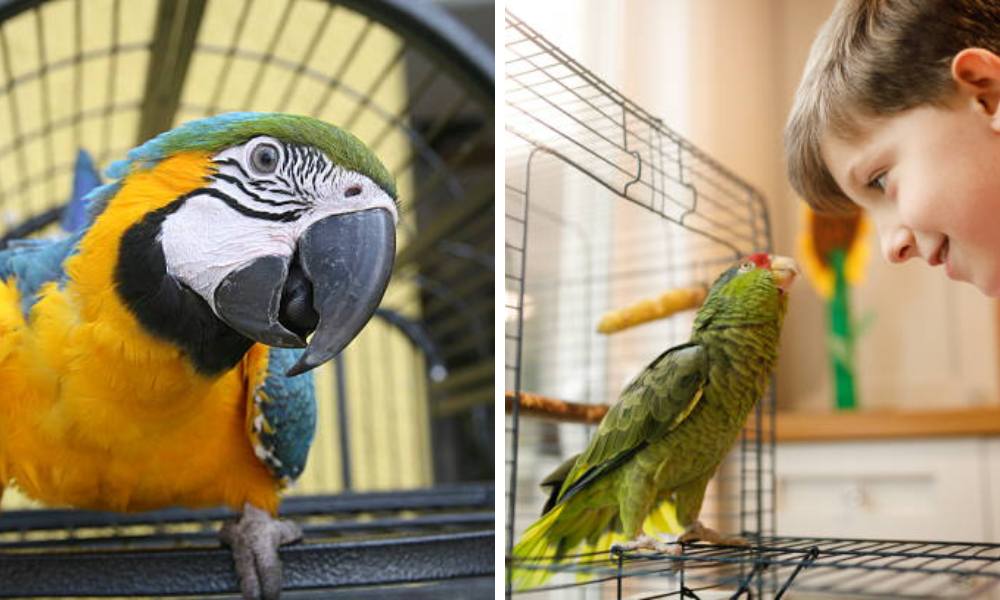
Size Matters: Choosing the Right Cage Size
The sizes of the cage are one of the most critical factors to consider. A cage that is too small can lead to a host of problems, including stress, feather plucking, and even aggression. Parrots need room to stretch their wings, climb, and play. For two parrots, the cage should be even larger to accommodate both birds comfortably.
When selecting a cage, always go for the largest one you can afford and fit into your home. Pay attention to the inside dimensions, such as inside height and inside room, to ensure the cage is spacious and comfortable for your birds. A good rule of thumb is to ensure that the cage is at least twice the wingspan of your parrot. This allows them to move freely and engage in natural behaviors. Remember, a happy parrot is a healthy parrot, and the right cage size plays a significant role in their happiness.
Material and Construction: Ensuring Safety, Durability, and Proper Bar Spacing
The material and construction of the cage are equally important. Parrot cages should be made from non-toxic materials, as parrots love to chew and explore with their beaks. Stainless steel cages are often recommended because they are durable, easy to clean, and safe for birds. Avoid cages with lead or zinc, as these can be toxic to parrots.
The construction of the cage should be sturdy and secure. Parrots are known for their intelligence and can figure out how to open simple latches. Ensure that the cage has secure locks to prevent any escape attempts. Additionally, the bars should be appropriately spaced to prevent your parrot from getting their head or wings stuck. The cage's construction should also be suitable for various bird species, including canaries, to ensure their safety and comfort.
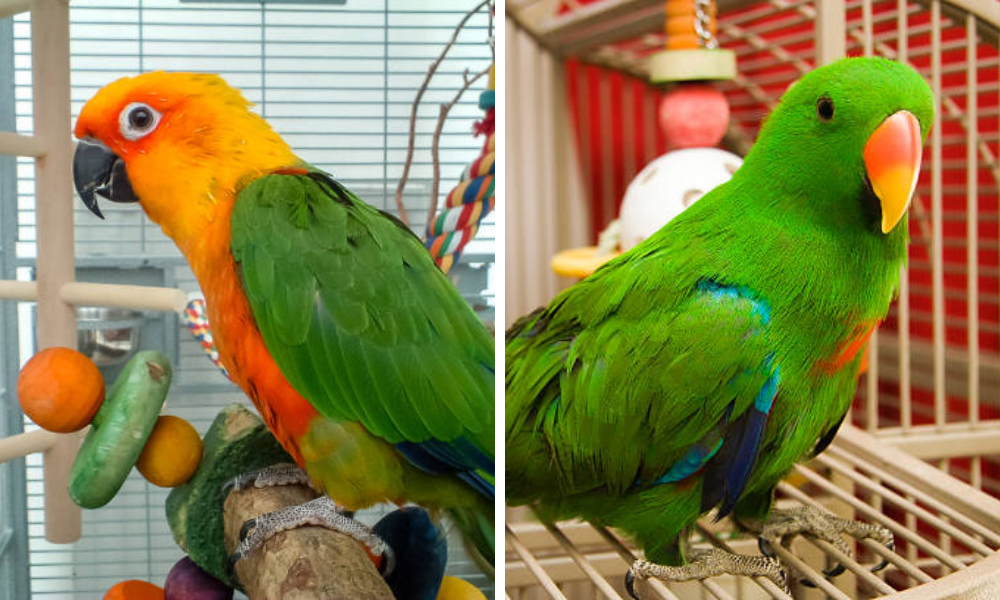
Placement of the Cage: Finding the Perfect Spot and Stand
Where you place the cage in your home can significantly impact your parrot's well-being. Parrots are social creatures and prefer to be where the action is. Placing the cage in a room where the family spends a lot of time can help your parrot feel included and engaged. However, avoid placing the cage in direct sunlight or drafty areas, as extreme temperatures can be harmful.
It's also essential to ensure that the cage is at eye level. This helps your parrot feel more secure and part of the family. Avoid placing the cage on the floor, as this can make your parrot feel vulnerable. A sturdy stand can help elevate the cage to the right height and provide a stable base.
Accessories and Enrichment: Keeping Your Parrot Engaged
A cage is not just a place for your parrot to sleep; it’s their entire world. Therefore, it’s essential to provide plenty of enrichment to keep them engaged and happy. Toys, perches, and swings can provide mental and physical stimulation. Rotate the toys regularly to keep things interesting and prevent boredom. There is a wide variety of toys and accessories available in different colors to keep your parrot engaged and happy.
Food and water dishes should be easily accessible and placed in a way that minimizes mess. Parrots love to chew, so providing safe, chewable toys can help keep their beaks healthy and prevent destructive behavior. Additionally, consider adding a bird bath or misting system to help keep their feathers in top condition.
Cleaning and Maintenance: Ensuring a Healthy Environment
Regular cleaning and maintenance of the cage are crucial for your parrot’s health. A dirty cage can lead to a host of health problems, including respiratory issues and infections. Clean the cage daily by removing uneaten food, droppings, and any soiled bedding. A thorough cleaning should be done weekly, including washing the cage bars, perches, and toys.
There is a wide collection of bird-safe cleaning products and supplies available to ensure a healthy environment for your parrot. Using bird-safe cleaning products is essential to avoid exposing your parrot to harmful chemicals. Stainless steel cages are easier to clean and maintain, making them a popular choice among parrot owners. Regular maintenance also includes checking for any signs of wear and tear, such as rust or broken bars, and addressing them promptly.
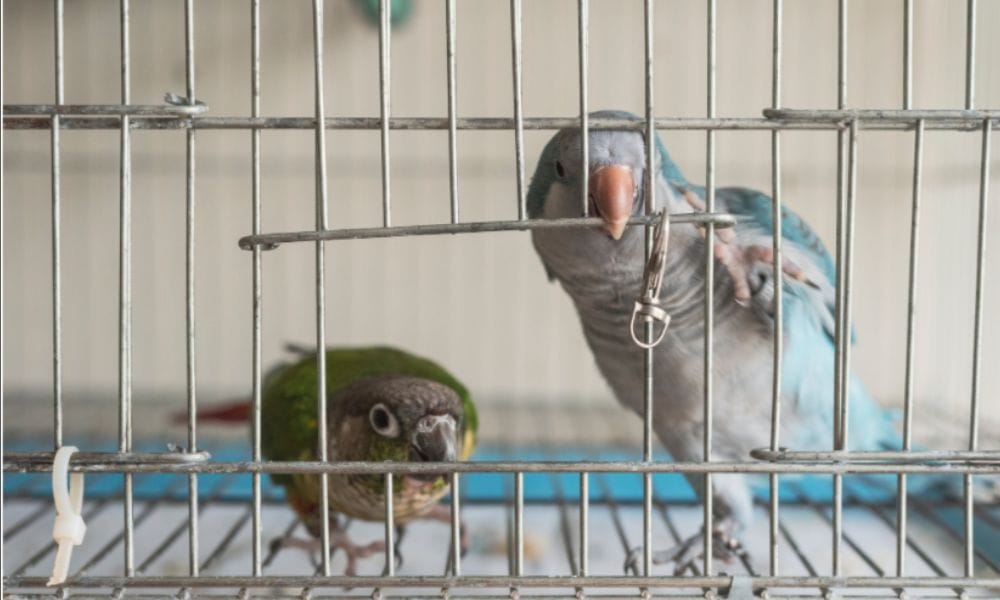
Diet and Nutrition: Providing the Right Food
A balanced diet is crucial for your parrot’s health and longevity. Parrots require a varied diet that includes fresh fruits, vegetables, seeds, and pellets. The goal is to provide a balanced diet to ensure the parrot's health and longevity. Avoid feeding your parrot a diet that consists solely of seeds, as this can lead to nutritional deficiencies. Fresh water should be available at all times and changed daily.
It’s also essential to monitor your parrot’s weight and adjust their diet accordingly. Overfeeding can lead to obesity, while underfeeding can result in malnutrition. Consult with an avian veterinarian to ensure that your parrot is receiving the right nutrients and to address any dietary concerns.
Social Interaction: Building a Bond with Your Parrot
Parrots are highly social animals and thrive on interaction with their human companions. Spending quality time with your parrot can help build a strong bond and prevent behavioral issues. Talk to your parrot, play games, and provide opportunities for out-of-cage time. This interaction is essential for their mental and emotional well-being. Keeping in touch with your parrot through regular interaction and communication is crucial to building a strong bond, so spend time with your feathered friends!
Training your parrot can also be a rewarding experience for both you and your bird. Positive reinforcement techniques, such as using treats and praise, can help teach your parrot new tricks and behaviors. Training sessions should be short and fun to keep your parrot engaged and motivated.
Health and Veterinary Care: Ensuring Longevity
Regular veterinary care is essential for keeping your parrot healthy. Annual check-ups with an avian veterinarian can help detect any potential health issues early and ensure that your parrot is in good condition. Vaccinations, parasite control, and routine blood work are all part of comprehensive avian care.
It's also important to be aware of the signs of illness in parrots, such as changes in behavior, appetite, or droppings. Parrots are masters at hiding illness, so any subtle changes should be taken seriously. Prompt veterinary attention can make a significant difference in your parrot's health and longevity.
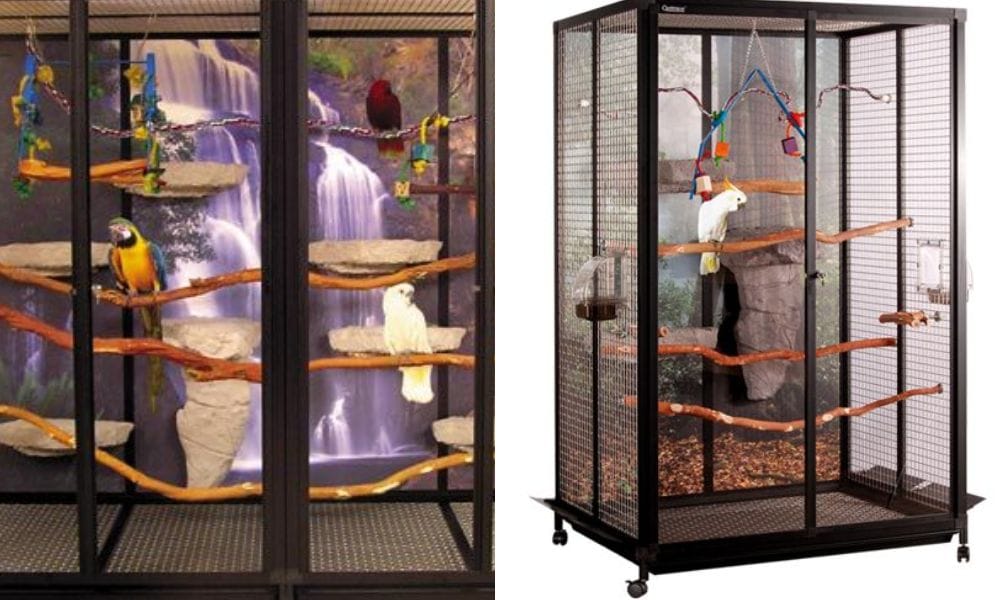
Traveling with Your Parrot: Ensuring Safety and Comfort
Traveling with a parrot requires careful planning and consideration. A travel cage or carrier is essential for keeping your parrot safe during trips. The carrier should be well-ventilated, secure, and comfortable. Familiarize your parrot with the carrier before the trip to reduce stress.
It's important to shop for the right travel cage and supplies to ensure your parrot's safety and comfort during trips.
When traveling by car, ensure that the carrier is securely fastened and away from direct sunlight or drafts. If traveling by air, check with the airline for specific requirements and regulations regarding pet travel. Always carry essential supplies, such as food, water, and any medications your parrot may need.
Summary
Choosing the right cage for your parrot is a critical decision that impacts their health, happiness, and overall well-being. From selecting the appropriate size and material to ensuring proper placement and enrichment, every detail matters. Regular maintenance, a balanced diet, and social interaction are essential components of responsible parrot care. By understanding and meeting your parrot's unique needs, you can provide a safe and nurturing environment that allows them to thrive.
FAQ
What size cage is best for my parrot?
The best cage size for your parrot depends on the species. A general rule is to choose a cage that is at least twice the wingspan of your parrot. Larger species like macaws require more space, while smaller parrots like budgies can thrive in smaller cages. Always opt for the largest cage you can accommodate to ensure your parrot has enough room to move and play.
How often should I clean my parrot's cage?
Daily cleaning is essential to remove uneaten food, droppings, and soiled bedding. A thorough cleaning should be done weekly, including washing the cage bars, perches, and toys. Using bird-safe cleaning products is crucial to avoid exposing your parrot to harmful chemicals. Regular maintenance helps prevent health issues and keeps the cage environment healthy.
What should I feed my parrot?
A balanced diet for a parrot includes fresh fruits, vegetables, seeds, and pellets. Avoid feeding a diet that consists solely of seeds, as this can lead to nutritional deficiencies. It is important to sort and organize the parrot's diet to ensure they receive a balanced and varied nutrition. Fresh water should be available at all times and changed daily. Consult with an avian veterinarian to ensure your parrot is receiving the right nutrients and to address any dietary concerns.
